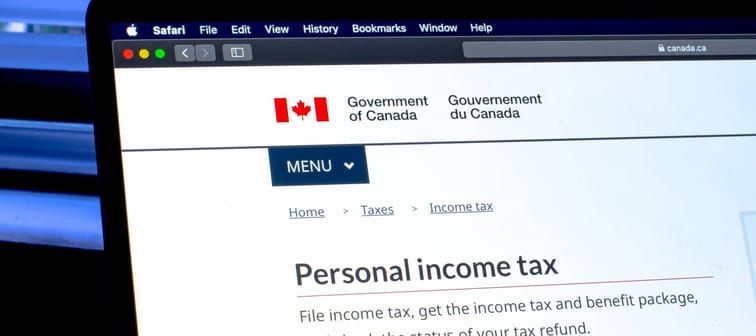What happens when you don’t file a tax return?
Even if you owe no money to the CRA, you should still file your taxes on time, especially if you’re entitled to any benefits or credits (these payments could get interrupted if you file past the deadline).
The CRA also imposes some pretty steep fees for Canadians who owe money on their returns, but don’t file them before the tax deadline.
There’s a late penalty fee of 5% on the previous year’s balance that you owe, with an extra 1% tacked on for every full month you file after the due date, up to 12 months.
Let’s say you owed $3,000, but filed your taxes three months late. This means you’re dealing with that 5% late penalty fee, plus another 3% for the three months you filed after the deadline — adding $240 to your total tax bill.
This gets worse if you were also charged a late-filing penalty for the past three years (2018, 2019 or 2020) and the CRA issued a formal demand for a return. You’ll face a penalty of 10% on your balance owing, plus an additional 2% for every full month you file after the due date, up to 20 months.
On top of this, the CRA also charges interest (compounded daily) for overdue taxes.
You could also be convicted of tax evasion if you don’t pay your taxes on time, which means you might have to deal with court-imposed fines, jail time and a criminal record as well.
Empower your investments with Qtrade
Discover Qtrade's award-winning platform and take control of your financial future. With user-friendly tools, expert insights, and low fees, investing has never been easier.
Start Trading TodayWhat should you do next?
It’s important that you file your tax return(s) as quickly as possible to avoid accruing any more interest or fees than you already have.
The CRA lets you file taxes as far back as 10 years, but you’ll need to submit paper returns for anything prior to 2017. For more recent returns, you can file using government services such as NETFILE.
The agency also recommends that you start with the oldest return, so you can take advantage of any carry-over amounts from the previous year.
There’s free help available through the Community Volunteer Income Tax Program if you have a modest income and a simple tax situation. If you have a more complicated tax situation, consider hiring a tax professional for expert assistance.
If the CRA hasn’t contacted you about your late tax filing yet, you could also apply for the Voluntary Disclosures Program (VDP). This program grants relief on a case by case basis to those who come forward to declare errors in their tax filings, or funds that they owe. You’ll still need to pay the taxes owed, but you could potentially qualify for relief from prosecution and financial penalties.
To apply, either submit the RC199 form, or a letter that includes the required information from the form, as well as any related returns, forms and schedules and an estimated payment time for your owed taxes.
More: Best tax software
What if you can’t afford to pay your taxes?
File your tax returns on time, even if you can’t afford to pay taxes you owe. Then reach out to the CRA (1-888-863-8657) to find out what your options are.
You can make partial payments, which will cut down on the interest you owe, as opposed to paying nothing at all.
Also consider negotiating a payment arrangement that lets you pay your tax debt in smaller instalments over time — just watch out for interest and penalties if you can’t meet the payment deadlines.
If you aren’t able to meet your tax obligations due to situations beyond your control, submit a request to the CRA to either waive or cancel penalties and interest. Just keep in mind that the CRA can only grant relief for penalties or interest from the past 10 years.
More: How to pay off debt
Trade Smarter, Today
Build your own investment portfolio with the CIBC Investor's Edge online and mobile trading platform and enjoy low commissions. Get 100 free trades and $200 or more cash back until March 31, 2025.








